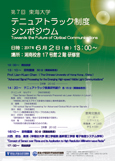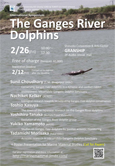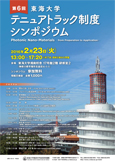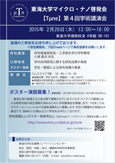Event
Water-Sensitive Urban Designs for Sustainable Cities and Communities, by Dr. Md Sayed Iftekhar
On November 28, a special lecture titled "Water-Sensitive Urban Designs for Sustainable Cities and Communities" was presented by Associate Professor Sayed Iftekhar from Griffith University, Australia. The special lecture was hosted and organized by Dr. Farhad Taghizadeh-Hesary.
The recorded video of the lecture can be accessed through the link below:
https://youtu.be/gdiwV5iJOrQ?si=9zYrY2CjtIiR1g3x
 |
Sustainable Solutions for Meeting the Carbon Neutrality Goals seminar (Nov 24, 2023 - Tokyo)
On November 24, 2023, the "Sustainable Solutions for Meeting the Carbon Neutrality Goals" seminar took place at the Shibuya campus of Tokai University. The seminar delved into topics such as the emission trading scheme, carbon pricing, and climate finance. This collaborative event was organized by the Tokai University Research Institute for Environment and Sustainability (TRIES), the Institute of Energy, Environment, and Economy of Tsinghua University (3E), and the International Society for Energy Transition Studies (ISETS). Dr. Farhad Taghizadeh-Hesary hosted the event.
The recorded video of the seminar is accessible through the link below.
https://youtu.be/h4yCiGaG9GQ?si=HAKmrLFH2g5P2TLv
 |
Dr. Farhad Taghizadeh-Hesary co-hosted the Tokyo Energy Transition Forum & The 5th ISETS Energy Transition Forum on Oct 14, 2022.
On Oct 14, 2022, the Tokyo Energy Transition Forum & The 5th ISETS Energy Transition Forum co-organized by Tokai University (Faculty of Policy Science and Economics; School of Global Studies; TOKAI Research Institute for Environment and Sustainability (TRIES)); The University of Kitakyushu; The International Society for Energy Transition Studies (ISETS) at Takanawa campus of Tokai University and in ZOOM platform.
The forum was co-hosted by Prof. Satoshi Honma (Tokai University, Japan), Dr. Farhad Taghizadeh-Hesary (Tokai University, Japan), and Prof. Yoshiaki Ushifusa (The University of Kitakyushu, Japan), and sponsored by KAKENHI (Grant-in-Aid for Scientific Research (B) No. 22H03816.
The forum started with the welcoming remarks of Prof. Naoto Yoshikawa, Vice Chancellor for Global Initiatives, Tokai University, Japan Professor, School of Global Studies. And Prof. Xunpeng (Roc) Shi, Professor, University of Technology Sydney; Australia; President of The International Society for Energy Transition Studies (ISETS).
The forum had two keynote speeches and seven presentations, and discussions.
In the first keynote speech, Prof. Kazuo Matsushita highlighted that the climate crisis is a human rights crisis, especially the "crisis of children's rights. For Decarbonization" and fossil-free societies, specific climate change countermeasures are required which are not only beneficial for the environment but also for energy security.
In the second keynote speech, Prof. Naoyuki Yoshino highlighted the role of fiscal policy and optimal portfolio allocation for achieving carbon neutrality. He stressed the importance of developing a global green credit rating system and global carbon taxation system to avoid distortion of investments in sustainability projects.
Session 1, had three presentations.
In the first presentation, Prof. Youngho Chang’s presented the opportunities and challenges of transition to net zero in developing Asia. He proposed that it is necessary to develop new business modes to accommodate new consumers’ behavior in delivering zero carbon assets in homes and businesses.
In the second presentation, Prof. Jinjun Xue presented on the Russia-Ukraine war, the energy crisis, and political and geographical reconstruction. He mentioned that the war is changing the geopolitics of energy and raised concerns on (1) environmental pollution, (2) carbon emissions, (3) timetable and pathway of carbon neutrality, and (4) international cooperation on energy and climate.
In the third presentation, Dr. Yuki Kudoh presented the role of novel technologies in achieving carbon neutrality. Both the significant reduction of CO2 and the introduction of negative emission technologies are indispensable. According to his presentation, Further innovations are required to achieve carbon neutrality with economic feasibility, and discussions are needed on ensuring the competitiveness of industries and necessary costs.
Session 2, had four presentations.
In the first presentation, Prof. Masashi Yamamoto presented on the role of waste-to-energy in achieving carbon neutrality. Waste-to-energy plants burn municipal solid waste to produce steam in a boiler that is used to generate electricity. He mentioned that waste-to-energy remains to be an important tool to minimize social costs (CO2 emissions + material recovery).
In the second presentation was by Prof. Gazi Salah Uddin on the impact of the clean energy transition on growth, environment, and welfare in Bangladesh. His empirical study showed that solar energy helped rural males engage in non-farm activities such as trading businesses and females in poultry farming. These income-generating activities create opportunities for more expenses in food and non-food expenditure and asset formation.
In the third presentation, Dr. Daniel del Barrio Alvarez assessed the role of power connectivity in the energy transition and sustainability. Power connectivity can bring energy security, economies of scale, and political cooperation. He added that power connectivity could increase the resilience of national electricity systems. However, the underlying rationale for the success (or not) of power connectivity initiatives is not simple, as it involves various disciplines and requires more research.
In the final presentation, Dr. Gagan Deep Sharma, underlines the impact of energy poverty on social change and well-being. Energy poverty impacts the citizens' quality of life, work ethic, and personal life. It can impede society's growth, and policymakers need to pay special attention to it.
Link to the recorded video of the forum: https://youtu.be/Fn_AI71h1sI
 |
Dr. Farhad Taghizadeh-Hesary was awarded the Japanese Ambassador's commendation
On Sep 19, 2022, Dr. Farhad Taghizadeh-Hesary was awarded the Japanese Ambassador's commendation at the Embassy of Japan in Tehran.
Ambassadors of Japan worldwide every year present commendations to those who had a remarkable role in promoting the cultural, scientific, or economic Collaborations between Japan and other nations and those who had a role in increasing the mutual understanding between the Japanese and other nations.
Dr. Farhad Taghizadeh-Hesary received this commendation for boosting the scientific and academic cooperation between Japan and Iran during the last years by organizing several joint research projects between the researchers in the two countries. The ceremony was at the opening of the Japan cultural month in Iran.
 |
 |
|
 |
 |
Dr. Farhad Taghizadeh-Hesary gave a lead speech during the 6th CAREC Think Tank Development Forum on Sep 15, 2022
The Sixth Annual CAREC Think Tank Development Forum (CTTDF) was organized in a hybrid format (physical and online) in Baku, Azerbaijan, on September 15-16, 2022, under the theme “Recalibrating Growth Dynamics for Inclusive and Sustainable Economies”. The Forum was organized in partnership with ADB-PRC Regional Knowledge Sharing Initiative (RKSI), Economic and Scientific Research Institute (ESRI) of the Ministry of Economy of Azerbaijan, Center for Economic and Social Development (CESD), Azerbaijan, and supported by the ADB.
The CTTDF is annually organized under the auspices of the CAREC Think Tank Network (CTTN). Every year the Forum brings together leading practitioners from think tanks, multilateral development partners, governments, and the private sector from the CAREC region to brainstorm regional challenges and provide diverse perspectives and innovative solutions to address these challenges through dialogue, experience sharing, and knowledge collaboration.
In its sixth year, the CTTDF’s main discussions were around regional growth, inclusivity, and sustainability. The leading regional think tanks and experts presented and deliberated upon, among others, (i) the outcomes of the CTTN regional research project on “COVID-induced inequalities: education, health, digital access, and women’s workforce participation.” (ii) the state of progress on UN Sustainable Development Goals (SDGs) in the region; (iii) climate change and green energy in the CAREC region; and (iv) geopolitical uncertainties, COVID-19, and the impact on growth and inclusivity.
Dr. Taghizadeh-Hesary was the lead speaker in session V: Climate Change and Green Energy, and his presentation was entitled: Sustainable Solution for Achieving Energy Security in the CAREC Region.
 |
Dr. Farhad Taghizadeh-Hesary gave a keynote speech at The 5th SEDBM conference of the Academy of Finance, Hanoi, Vietnam
The 5th Conference on Sustainable Economic Development and Business Management in the Context of Globalization (SEDBM 5) was organized on Aug 19, 2022, by the Academy of Finance of the Ministry of Finance of Vietnam in Hanoi and also in ZOOM (hybrid mode).
During this event, more than 400 researchers, professors and experts of management, finance, accounting and economics were participated.
Dr. Farhad Taghizadeh-Hesary was invited to give the keynote speech at this conference. His keynote speech was entitled: Role of credit guarantee scheme in the business recovery
 |
Dr. Farhad Taghizadeh-Hesary hosted a lecture by the director of the Financial Research Center at the Financial Services Agency (FSA), Government of Japan.
On July 05, 2022, Dr. Naoyuki Yoshino, Director of the Financial Research Center at the Financial Services Agency (FSA), Government of Japan, gave a special lecture to undergraduate students of Tokai university. The special lecture was on "Bringing Private Investment into SDGs" and was held at the SDGs class of Dr. Farhad Taghizadeh-Hesary at the School of Global Studies.
Link to the recorded video of the lecture: https://youtu.be/u2wOQxEDuxI
 |
Dr. Farhad Taghizadeh-Hesary delivered a keynote speech at the PACIFIC Utility CEOs TALKS hosted by the Asian Development Bank (ADB).
Through the process of knowledge sharing, the CEO Talk Series Event provides a unique platform for policymakers and experts from the Pacific Developing Member Countries (DMCs) of the Asian Development Bank and other parts of the world to discuss important steps toward identifying key priorities for the state-owned enterprises (SOEs) reform and transformative measures. The SOEs' reform and transformative measures goal is to help to improve utilities' financial performance and creditworthiness which can lead to an increased partnership with the private sector in developing clean and renewable energy projects.
On June 9, 2022, ADB hosted the PACIFIC Utility CEOs TALKS - Rethinking energy reforms: Pacific utility sustainability – reality or myth? By inviting the CEO of the utilities from the pacific DMCs, policymakers, and experts from the bank. Dr. Farhad Taghizadeh-Hesary, editor of the book: Reforming State-owned Enterprises, was invited to give the event's keynote speech. His keynote speech was entitled: Reforming and Greening the Pacific Utilities.
 |
Dr. Farhad Taghizadeh-Hesary hosted a lecture by a scholar from the University of Oxford for the Tokai University students.
On April 19, 2022, Dr. Troy Sternberg of the University of Oxford visited Tokai University and gave a special lecture to undergraduate students on "Central Asia & Sustainable Development Goals: politics, economics, and environment" at the SDGs class of Dr. Farhad Taghizadeh-Hesary.
Link to the recorded video of the lecture: https://youtu.be/WOa7XQ2Oa_8
 |
Tokyo Energy Transition Forum & The 5th ISETS Energy Transition Forum
Oct 14, 2022
Tokai University, Tokyo, Japan
With the Fukushima nuclear disaster in March 2011 and the shutdown of all nuclear power plants, Japan's energy self-sufficiency and energy security deteriorated drastically. Japan substituted the nuclear loss by importing more coal, LNG, and oil. However, with the most recent oil price increase and the supply disruptions due to the Ukraine war and the global energy crisis, and because of the carbon neutrality goals set by the Japanese government, the country has ambitious plans for the energy transition and increasing the reliance on domestic renewable energy resources. Based on the energy transition strategies set by the Japanese government, while the share of nuclear energy is set to increase, the country plans to increase the share of renewable energy in power generation from 18% in 2019 to about 38% in 2030. This implies a massive investment in renewable energy, especially in the solar sector. According to the plan, coal consumption will be reduced from 26% to 19%. On the other hand, Japan plans to achieve a hydrogen society in the long-term, although currently, it represents only 1% of the energy demand; The country aims to reach 10% by 2050. With this background, Tokyo Energy Transition Forum and the 5th ISETS Energy Transition Forum planned to bring distinguished experts from Japan, Australia, Singapore, Sweden, and India to discuss ways to foster the energy transition and achieve a carbon neutrality society. The forum will be jointly organized by The Tokai University (School of Political Science and Economics; School of Global Studies; TOKAI Research Institute for Environment and Sustainability (TRIES)); The University of Kitakyushu; The International Society for Energy Transition Studies (ISETS) on Oct 14, 2022, at Tokai University in Tokyo and on the ZOOM platform.
▶ Draft of Agenda
▶ Biography of the speakers
 |
Dr. Farhad Taghizadeh-Hesary lectured at the workshop on “Role of Credit Guidance Policy in Industrial Development of Japan.”
On March 15, 2022, Dr. Farhad Taghizadeh-Hesary lectured at the workshop titled “Role of Credit Guidance Policy in Industrial Development of Japan”. The event was organized by the Iranian Presidency’s Technology Studies Institute (TSI). The audience was from various government agencies, including the Central Bank of Iran, Vice Presidency for Science and Technology, various know-ledge based companies, and academia. In this workshop, Dr. Taghizadeh-hesary reviewed the role of credit guidance policy in the industrial development of Japan with a historical approach. The lecture was based on his research on the history of industrial development of Japan and his forthcoming book on the topic. The workshop moderator was Dr. Roohallah Aboojafari, head of knowledge-based economics of TSI and the advisor to the minister of economic affairs and finance of Iran.
 |
Dr. Farhad Taghizadeh-Hesary lectured at the workshop on “Digital Revolution in the Oil, Gas and Petrochemical Industries.”
On March 10, 2022, The Research Institute of Petroleum Industry (RIPI) of the Ministry of Petroleum of Iran, Islamic Azad University of Iran, and Hashtbeit jointly organized the workshop on “Digital Revolution in the Oil, Gas and Petrochemical Industries”. The audience was the Iranian oil, gas, and petrochemical industries’ managers.
In this workshop, Dr. Farhad Taghizadeh-hesary lectured on the role of innovative and green finance to meet the Sustainable Development Goals (SDGs) in the oil, gas, and petrochemical industries. The lecture was based on his recent publications on the topic.
 |
Dr. Farhad Taghizadeh-Hesary Presented and Chaired the "Global Developments in the Corona and Post-Corona eras" conference hosted by Tehran University, Iran
On March 6nd, 2022, the conference titled "Global Developments in the Corona and Post-Corona Eras" was organized by the Faculty of World Studies of Tehran University, Iran.
Dr. Farhad Tahizadeh-Hesary chaired this conference's economics panel and presented his paper titled: "economic policies to make small and medium-sized enterprises survive in the wake of the Covid-19 and beyond: The Japanese Experience". The economics session had several distinguished speakers from various countries, including Japan, Iran, Vietnam, Russia, the Republic of Korea, and Indonesia, presenting their research findings and discussing. The participants were scholars, professors, researchers, and graduate studies of global studies, economics, and political science.
 |
Dr. Farhad Taghizadeh-Hesary presented his research findings at The Virtual Symposium on Fintech and Development hosted by Bradford University, UK.
On March 2nd, 2022, The Virtual Symposium on Fintech and Development was organized by Bradford University of UK.
Dr. Farhad Tahizadeh-Hesary was invited to present his latest publication on Fintech, Regtech, and Financial Development. This research was published in the “Financial Innovation” journal of Springer. This study contributes to this subject matter in three novel ways. First, it explores how fintech influences various dimensions of financial development, namely, access, depth, and stability across 290 cities in China. Second, it sheds light on how regtech can potentially enhance financial regulation effectiveness. Third, it highlights how active policy initiatives such as interest rate liberalization can improve financial development outcomes.
Link to the video of the symposium:
https://bradford-ac-uk.zoom.us/rec/share/4Uwhqq-tWdb0S1KfD_PeLIF-MiGvCR0TzXAoBJxDhhO5QFm-WRjUorjifcxVNjz3._YthFlndoiAAiMC-
Passcode: h@Dz55^0
 |
Dr. Farhad Taghizadeh-Hesary presented at the webinar on developing the gas network in Central Asia.
On Dec 15, 2021, Hallym University of the Republic of Korea organized a webinar on the development of the gas transport network of central Asia within the framework of the Eurasian energy network in the 21st Century.
In this webinar, scholars, and researchers from the Republic of Korea, Japan, Iran, and the US discussed the topic.
Dr. Farhad Taghizadeh-Hesary’s presentation was titled: Financing Challenges of Energy and Infrastructural projects in Iran.
 |
Dr. Farhad Taghizadeh-Hesary presented at the finance and banking research webinar hosted by FBNet - AVSE Global.
On Dec 13, 2021 the Finance and Banking Network (AVSE Global) and Finance and Banking Network (FBNet) co-organized a webinar where Dr. Farhad Taghizadeh-Hesary was invited to have his presentation on green finance for energy transition and green growth in the post-pandemic.
Participants were scholars and researchers of economics, finance, banking, and business from Asia and Europe. After the presentation, he answered the participants' questions about green finance and energy transition.
Finance and Banking Network (FBNet) is a non-profit organization specializing in Finance and Banking under the Association of Vietnamese Scientists and Experts Global (AVSE Global). The FBNet is one of the primary channels for Vietnamese scholars and practitioners to connect, learn, share, and exchange knowledge among themselves and with international experts.
 |
Dr. Farhad Taghizadeh-Hesary presented at the “Engaging Green Finance for Sustainable Urban Energy” workshop organized by APEC Sustainable Energy Center.
On December 9, 2021, APEC Sustainable Energy Center (APSEC) organized the 6th APEC Workshop on Sustainable Cities. The online workshop participants were from international financial institutions, cities, private enterprises, and academia discussed how the role of Green Finance can be enhanced to accelerate the transition to sustainable energy. Green Finance has received high emphasis due to COP26 in Glasgow this year.
The speakers were: Zeng Peng (Tianjin University), Jenny Karouw and Henriette jacoba Roeroe (North Sulawesi Regional Planning and Development Board), Farhad Taghizadeh-Hesary (Tokai University), PING YEAN Cheah (Asian Infrastructure Investment Bank), Dražen Kučan (GCF), Yiyang Shen (Inclusive Development Research Center), Lingang Zhang (Swiss Re), Steivan Defilla (APSEC), Xiaotong Gao (APEC CNSC Program Joint Operation Center), Maryke Alelo (Manado State Polytecnic) Joune Ganda (North Minahasa, North Sulawesi Province, Indonesia), Shiela Gail Satura-Quingco (Manila), Yong Chen (IRENA), and Zhexing Yan (Moderator, APSEC).
Dr. Farhad Taghizadeh-Hesary’s presentation titled was: developing an optimal green credit guarantee scheme.
 |
Dr. Farhad Taghizadeh-Hesary spoke at the “CAREC's flagship Energy Investment Forum 2021” hosted by the Asian Development Bank and the government of the Republic of Azerbaijan
CAREC's flagship Energy Investment Forum 2021 was organized on December 2, 2021. The Energy Investment Forum (EIF) is Central Asia’s flagship event to enable private investments in the energy sector. About $400 billion worth of energy sector investment is needed in the region up to 2030. Governments acknowledge that the public sector alone will not meet those financing needs. The EIF is thus Central Asia’s key vehicle to attract investors to the region. This year’s EIF discussed business opportunities in the field of energy efficiency.
The CAREC Program is a partnership of countries and development partners working together to promote development through cooperation. It is guided by the overarching vision of “Good Neighbors, Good Partners, and Good Prospects”. It includes Azerbaijan, People’s Republic of China, Georgia, Kazakhstan, Kyrgyz Republic, Mongolia, Pakistan, Tajikistan, Turkmenistan, and Uzbekistan.
Dr. Farhad Taghizadeh-Hesary, along with other panelists from the World Bank, European Commission, BASE, Signify, and so on, discussed ways to bring private investment to energy efficiency projects at the panel titled: “Suitable Business Models and Innovative Financing Approaches.”
The event was co-organized by the Asian Development Bank and the Government of the Republic of Azerbaijan.
 |
Dr. Farhad Taghizadeh-Hesary chaired the session at the 14th Int’l Tax Administration Conference hosted by the Asian Development Bank Institute and the University of New South Wales (Australia).
The 14th International Tax Administration Conference - New Frontiers in Tax Administration was organized on 23-24 November 2021. Cohosted by the Asian Development Bank Institute (ADBI) and the University of New South Wales (Australia), this conference examined the latest international developments in revenue administration and related COVID-19 impacts. Among the focuses included cutting-edge service delivery and compliance initiatives, data regulation, globalization of revenue administration and tax dispute resolution, and new approaches to protect the vulnerable. More than 125 delegates participated in this conference.
Dr. Farhad Taghizadeh-Hesary chaired the session on harnessing digitalization for voluntary tax compliance. In addition, along with other co-editors, he participated in the panel “Livestream Book Promotion: New Frontiers for Tax in the Digital Age”. In this panel, the co-editors of the book titled New Frontiers for Tax in the Digital Age introduced this forthcoming book. The book will be published in 2022 by Routledge publisher.
 |
Dr. Farhad Taghizadeh-Hesary delivered a keynote speech at the 3rd Rajagiri Conference on Economics and Finance.
On Nov 19-20, 2021, the 3rd Rajagiri Conference on Economics and Finance was jointly organized by Rajagiri Business School (India), The Indian Econometric Society (TIES), and the Waikato Management School, New Zealand.
This conference aimed to bring together international scholars working in economics and finance in the broadest sense of the words. The conference was structured around several thematically-focused sessions.
The conference had two keynote speakers.
The first keynote speaker was Dr. Ashima Goyal, the emeritus professor at Indira Gandhi Institute of Development Research (IGIDR), Mumbai. She has served on several boards and policy committees, including the Prime Minister’s Economic Advisory Council. Currently, she is a member of the Monetary Policy Committee of India’s Central Bank.
The second keynote speaker was Dr. Farhad Taghizadeh-Hesary. His keynote speech title was “Green Finance for Energy Transition and Green Recovery.”
 |
Dr. Farhad Taghizadeh-Hesary delivered a keynote speech at the “3rd Int’l conference on finance and accounting for the promotion of sustainable development in the private sector”, hosted by the Academy of Finance of Vietnam.
On Nov 12, 2021, the 3rd Int’l conference on finance and accounting for the promotion of sustainable development in the private sector was organized by the Academy of Finance of the Ministry of Finance of Vietnam.
This conference aimed to bring together domestic and international scholars working in accounting and finance to discuss ways to bring private investment into sustainability projects. The conference had a call for papers, and the accepted papers were presented and discussed at this event.
Dr. Farhad Taghizadeh-Hesary was the keynote speaker and the co-chair of this conference. His keynote speech title was “Green Finance for Energy Transition and Green Development.” More than 150 researchers and scholars participated in his keynote speech.
 |
Dr. Farhad Taghizadeh-Hesary contributed as an invited discussant in the 4th conference on CSR, the Economy and Financial Markets co-hosted by the Development Bank of Japan.
Following the success of the first three conferences on “CSR, the Economy and Financial Markets” in Tokyo (2017), Chicago (2018), and Düsseldorf (2019), the Fourth Conference returns to Tokyo (online) and the Development Bank of Japan. It was initially scheduled for November 2020, but due to the impact of the COVID-19 pandemic, it was postponed to 2021. The conference was organized on November 11-12, 2021, aimed to foster research and dialogue regarding the economic effects of corporate social responsibility.
The conference was sponsored by the Global Finance Journal and Organized by the Global Finance Journal, Development Bank of Japan and the Japan Economic Research Institute.
Dr. Farhad Taghizadeh-Hesary, the Global Finance Journal editorial board member, participated in this conference as the invited discussant.
Agenda: https://www.dbj.jp/ricf/en/pdf/event/2021/conference202111.pdf
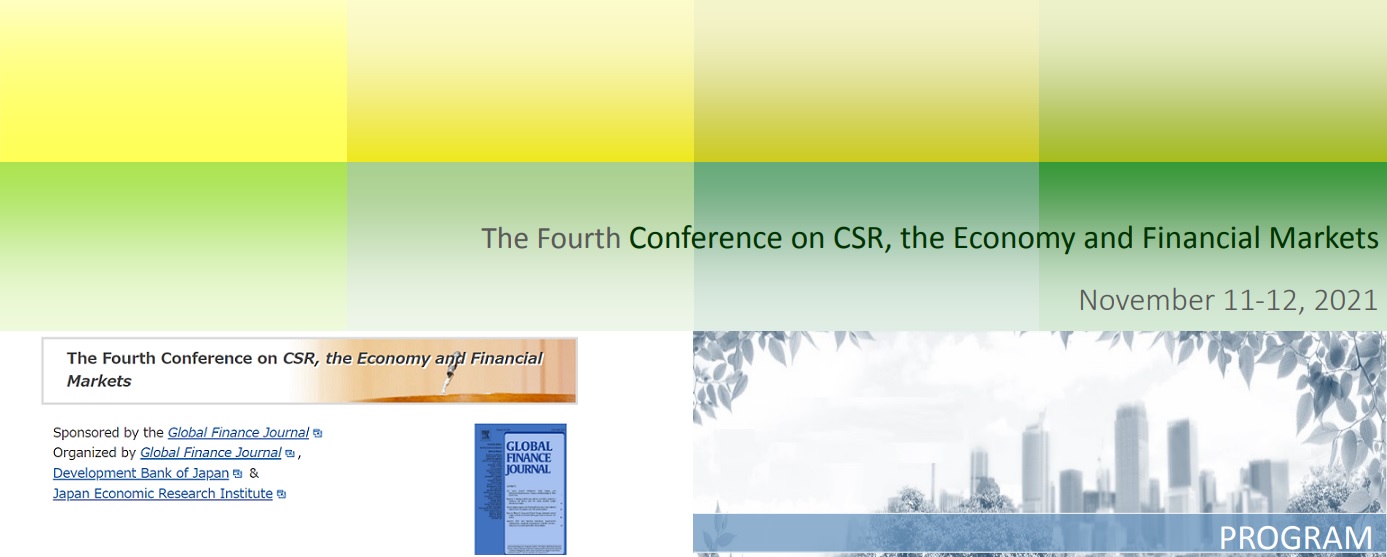 |
Dr. Farhad Taghizadeh-Hesary was invited by the Institute for Forecasting and Macroeconomic Research (IFMR), Uzbekistan, to present on energy security.
On Oct 28, 2021, a webinar was organized by the Institute for Forecasting and Macroeconomic Research (IFMR), Uzbekistan, where Dr. Farhad Taghizadeh-Hesary was invited to have a presentation on ways to achieve energy security in Central Asia.
IFMR operates under the president of Uzbekistan. The institute was established to conduct in-depth macroeconomic research that helps develop solid scientific and methodological studies to forecast macroeconomic indicators and prepare proposals for government development plans.
The primary purpose of this webinar was to assess the role of renewable energy in achieving energy security. In addition, a scientific method for quantifying energy security was presented to be used by the governments for setting their energy security goals.
Link to the video of the webinar: https://youtu.be/6yZhOG0AtUg
 |
Dr. Farhad Taghizadeh-Hesary co-hosted the workshop of the Handbook of Energy Policy.
On Oct 21-22, 2021, the workshop associated with the Handbook of Energy Policy (Springer) was successfully organized. The event was jointly organized by Tokai University, Southwestern University of Finance and Economics, the International Society for Energy Transition Studies (ISETS), and Springer Nature (Publisher).
The event started with the welcoming remarks of Professor Naoto Yoshikawa, Vice Chancellor for Global Initiatives of Tokai University.
The first-day keynote speaker was Professor Xiansheng Sun, Ex-Secretary General of the International Energy Forum, Vice President & Director General of Energy Industry Cooperation Committee, China Council for International Investment Promotion, and the Council Chairman of The International Society for Energy Transition Studies (ISETS).
The second-day keynote speaker was Dr. Xunpeng (Roc) Shi, Principal Research Fellow, the Australia-China Relations Institute, University of Technology Sydney (Australia); Distinguished Research Fellow at Nanjing University (China); Visiting Professor at the Hubei University of Economics (China) and the co-founder and President of the ISETS.
There were insightful presentations and discussions by the contributors of the chapters to the handbook from various countries, including Japan, China, Bangladesh, Italy, Bhutan, India, Sweden, Iran, France, UK, Australia, South Korea, Laos, Malaysia, Scotland, Indonesia.
The chapters of this forthcoming handbook cover a wide range of issues of energy policy, including energy security, energy poverty, energy finance, energy pricing, energy and environment, energy and sustainability, energy and growth, energy efficiency, energy trade, technological innovation and energy, energy transition, energy nexus studies, economics, and policy of fossil fuels, economics, and policy of renewable and green energies.
Dr. Farhad Taghizadeh-Hesary and Prof. Dayong Zhang (Southwestern University of Finance and Economics) are the two editors of the handbook and they jointly hosted this workshop.
- Agenda: https://lnkd.in/gs2Dg96M
The video of both days of the event was recorded and available through bellow links:
- Day 1: https://lnkd.in/gYiJTqpw
- Day 2: https://lnkd.in/gUfYcTmG
 |
Dr. Farhad Taghizadeh-Hesary presented at The 7th Asia-Pacific Energy Sustainable Development Forum.
The 7th Asia-Pacific Energy Sustainable Development Forum was held by APEC Sustainable Energy Center (APSEC) from Sep 15th to 17th. The Sub-forum “Energy Transition and Low Carbon Green Development” was held on Sep 17., which was organised by the Energy Transition Solutions (ETS) Team of APSEC. Dr. Hom-Ti Lee, Chair of EGNRET of APEC Energy Working Group (EWG), delivered opening remarks. Dr. Farhad Taghizadeh-Hesary presented on the role of green finance for energy transition and low carbon green development.
The institutions participating in the Sub-forum include Asian Institute of Technology, Beijing Energy Club, University of San Francisco, World Forum Offshore Wind, Energy Exemplar Pty Ltd, China Renewable Energy Engineering Institute, Agora Energiewende, Australian National University, Global Green Growth Institute, ASEAN Centre for Energy (ACE), Tokai University, International Renewable Energy Agency (IRENA), China Electric Power Planning & Engineering Institute, etc.
The Sub-forum was hosted by Prof. Jinlong Ma, and was divided into two sessions of “Supporting and Accelerating Energy Transition Through Innovation and Technology” and “Regional Experience and Practices of Low Carbon Development”. The participants comprehensively shared valuable experience in achieving energy transition from multiple aspects such as energy efficiency, technological innovation, and green finance etc.
 |
Tehran University invited Dr. Farhad Taghizadeh-Hesary to present on the energy transitions in Japan in the post-Fukushima
Tehran University, Faculty of World studies every month, organizes series of lectures on Japan-related topics. Each month, an expert is invited to speak on topics related to Japan for those interested in Japan. This month's meeting was organized on June 21, 2021, and the invited speaker was Dr. Taghizadeh Hesary. His presentation was about the energy transitions in Japan in post-Fukushima. The presentation was entitled: Fukushima nuclear disaster and the energy sector of Japan- role of renewable energy in achieving energy security.
Participants were graduate students, faculty members and experts of economics, energy, Japan studies, and the related topics. After the presentation, he answered the participants questions in a Q&A session.
Link to the video of the presentation: https://youtu.be/FiC5egOTY-k
 |
Dr. Farhad Taghizadeh-Hesary’s Podcast on “Lessons from the Japanese solar power market” broadcasted on iTunes and Spotify.
In the Podcast, based on a dialogue between Dr. Farhad Taghizadeh-Hesary and Mr. Sohail Hasnie (Principal Energy Specialist of the Asian Development Bank), Dr. Taghizadeh-Hesary shared his insight from his research work on reasons for the continuous decline of solar power prices.
He explains the transition from fossil fuel. His research focus is energy economics, energy policy, and the financial side of green energy. Dr. Farhad Taghizadeh-Hesary also explained his findings in the green finance field, including the green credit guarantee scheme that is designed to facilitate private investments in green projects. He discussed the factors affecting the supply and the demand of green technologies, including solar modules. They also talked about how and why the prices of Solar Power in Japan are much higher than that of other countries and actions manufacturers have taken in the country to lower the cost. They also touched on the innovative Home Town Investment Trust Fund in Japan that facilitates the development of small and medium-sized solar energy projects.
The Podcast was broadcasted on iTunes, Spotify, and other major platforms.
- iTunes: https://podcasts.apple.com/.../lessons.../id1503713708...
- Spotify: https://open.spotify.com/episode/3RYOiaIKm1AMTFcGKf7Tz0
- Podchaser: https://www.podchaser.com/podcasts/energypreneurs-1080013
- Podcastaddict: https://podcastaddict.com/podcast/2921782
 |
Dr. Farhad Taghizadeh Hesary was awarded a certificate of appreciation from the United Nations Development Programme (UNDP) office in Iran and the Department of Environment.
On Sep 11, 2021, Dr. Farhad Taghizadeh Hesary was awarded a certificate of appreciation by the United Nations Development Programme (UNDP) office in Iran and the Department of Environment (DOE). The certificate presented to Dr. Taghizadeh-Hesary for his effective role as an instructor and presenter on financial mechanisms under The United Nations Framework Convention on Climate Change (UNFCCC) at the Climate Promise project. The Climate Promise is the UNDP commitment to support at least 100 countries enhance their Nationally determined contributions (NDCs). UNDP is working with countries to make their NDCs more technically robust and include new ways governments can follow their climate actions, as well as finance their national goals. In Iran, Department of Environment is the partner institute of UNDP.
 |
Dr. Farhad Taghizadeh-Hesary Lectured at the Summer School of Environmental Economics.
On July 29, 2021, Dr. Farhad Taghizadeh-Hesary lectured at the summer school of environmental economics.
The summer school was organized by Allameh Tabatabaei University (Iran) and Shahid Beheshti University (Iran).
The participants were undergraduates students, graduate students, and faculty members of Iranian universities.
Participation in this summer school was free of charge, and the lecture was in the Persian language.
Dr. Farhad Taghizadeh-Hesary’s lecture was on green finance and sustainable development.
 |
Dr. Farhad Taghizadeh-Hesary presented the Japanese experience of crowdfunding at the educational webinar.
On July 27, 2021, an educational webinar on crowdfunding was organized by the Vice-Presidency for Science and Technology of Iran.
The Vice-presidency invited Dr. Farhad Taghizadeh-Hesary to present the Japanese experience of crowdfunding for the Iranian experts.
His presentation was on Hometown Investment Trust Funds, a unique crowdfunding scheme that was born in Japan. The presentation was based on his research on this type of fund. The participants were policymakers, researchers, and experts of crowdfunding and finance.
After the presentation, Dr. Taghizadeh-hesary answered the questions of the participants.
Link to the video of the webinar: https://www.aparat.com/v/KrQk0/
 |
Dr. Farhad Taghizadeh-Hesary lectured at the Master Class of Economics Publication for the scholars and researchers in the ASEAN region
On Aug 10, 2021, Dr. Farhad Taghizadeh-Hesary presented ways to run high-quality research and publishing in impact journals and book volumes for the scholars and researchers of the ASEAN region. The event was organized by the ASEAN Economics Research Centre and Chiang Mai University. In the first part of this academic masterclass, Dr. Taghizadeh-hesary shared his personal experiences as a senior researcher, lecturer, guest editor and member of editorial boards of several high-impact journals about the points that the researchers need to note if they are targeting to publish their works in indexed international journal and books. In the second part of this masterclass, Dr. Taghizadeh-Hesary introduced his Handbook of Green Finance and talked about green finance, sustainability, and energy security as a case.
 |
Dr. Farhad Taghizadeh-Hesary Chaired the Special Track Session at the 10th International Conference on Asian Economic Development.
On Sep 9, 2021, the special track session at the 10th International Conference on Asian Economic Development was organized with the chairmanship of Dr. Farhad Taghizadeh-Hesary. In this special session which was on the Green Economic Recovery in the post-pandemic in the ASEAN region, the selected papers of the call-for-chapters on the same topic were presented. The session had eight presentations by scholars from various countries, including Bangladesh, India, Iran, Japan, Lao PDR, Thailand, and Singapore.
Dr. Farhad Taghizadeh-Hesary commented and discussed the papers that were presented in this session. The contributors will revise their chapters based on the comments. The revised version of the papers will be published in a book volume with the Chief-Editorship of Dr. Farhad Taghizadeh-Hesary. The event was organized by the Faculty of Economics, Chiang Mai University (Thailand).
 |
Dr. Farhad Taghizadeh-Hesary Chaired the Session at the “Emerging Topics in Financial Economics” Symposium
On Sep 9-10, 2021, the "Emerging Topics in Financial Economics Symposium" was hosted by the Department of Management and Engineering, Linköping University, Sweden. In this virtual symposium, Dr. Farhad Taghizadeh-Hesary chaired the “Financial Economics: Systemic Risk” session. In this event, several quality papers on portfolio optimization and risk management, systemic risk assessment, energy and commodities markets, macro-finance, and development economics were presented by authors from various European universities, including Linköping University (Sweden); Jönköping University (Sweden); Uppsala University (Sweden); University of Milano-Bicocca (Italy); Trinity Business School (Ireland); Southampton Business School (UK); University of Vaasa (Finland) and SGH Warsaw School of Economics (Poland).
 |
Dr. Farhad Taghizadeh-Hesary co-hosted the “Green Digital Finance for Achieving the SDGs” webinar.
The “Green Digital Finance for Achieving the SDGs” webinar was jointly organized by Tokai University, Yonsei University, Springer Nature, Green Finance Forum-Korea, Asia Research Center, and The International Society for Energy Transition Studies (ISETS) on June 30 – July 1, 2021.
In this 2-days webinar, distinguished presenters and discussants from academia, research institutes, government agencies, and industry from Japan, Korea, Azerbaijan, Bangladesh, Belgium, Finland, India, Malaysia, Singapore, Sweden, Thailand, Turkey, and Uzbekistan, presented their research findings on the topic.
The final version of the studies presented in this webinar will be published in a book volume by Springer Nature with the chief editorship of Dr. Farhad Taghizadeh-Hesary.
Video of day 1: Green Digital Finance webinar, June 30 2021 (Day 1) - YouTube
Video of day 2: Green Digital Finance webinar, July 1 2021 (Day 2) - YouTube
Biography of the speakers: http://www.pr.tokai.ac.jp/tuiist/english/tuiist/img/webinar20210630/005.pdf
Agenda: http://www.pr.tokai.ac.jp/tuiist/english/tuiist/img/webinar20210630/004.pdf
 |
Dr. Farhad Taghizadeh-Hesary co-hosted the webinar on innovative finance for technological progress.
“Innovative Finance for Technological Progress: Roles of Fintech, Financial Instruments, and Institutions” webinar was organized on July 5, 2021.
This webinar brought together policymakers, scholars, and experts from Japan, Iran, Singapore, Kazakhstan, Thailand, Bangladesh, Turkey, Sweden, and India to present best practices of financial innovations that facilitate innovative firms’ and startups’ access to finance and investment. In addition, it aimed to evaluate ways and methods to finance innovation and high technologies, especially in developing countries. The event was the joint webinar of Tokai University, Iran National Innovation Fund, Technology Studies Institute, and the Routledge publisher.
The output of this project will be published in an edited book volume by Routledge with the chief editorship of Dr. Farhad Taghizadeh-Hesary
Video: https://youtu.be/ZmEQFELuNGk?t=4
Biography of the speakers: http://www.pr.tokai.ac.jp/tuiist/english/tuiist/img/webinar20210705/003.pdf
 |
Dr. Farhad Taghizadeh-Hesary presented at the workshop on energy market integration in Northeast India hosted by ERIA and the Confederation of Indian Industry
The workshop titled “Energy Market Integration in NER -India: International Economic Linkages and Strategic Choices for Sub-Regional Cooperation” organized on March 26, 2021 virtually. The workshop's objective was to discuss the key findings of the study done by the Economic research Institute for ASEAN and East Asia (ERIA) to provide opportunities to increase regional energy market integration in NER India and ASEAN cooperation. Also, the workshop aimed to identify potential strategic steps towards greater sub-regional cooperation. This meeting was a concluding part of a larger study being carried out by ERIA in collaboration with the Confederation of Indian Industry (CII).
The study group members and presenters were senior-level experts and senior policy makers from the governments of India, Nepal, and Bhutan, the World Bank, ERIA, CII, and different universities, including the University of Tokyo, Tokai University, Australian National University, and McGill University.
Dr. Taghizadeh-Hesary is a member of this study group, and his presentation was on energy connectivity and cooperation between Gulf Cooperation Council (GCC), Iran, and South Asia.”
 |
Dr. Farhad Taghizadeh-Hesary presented at the ERIA’s working group on electricity market reforms. (ERIA: Economic Research Institute for ASEAN and East Asia)
Southeast Asia is on the way to achieving universal access to electricity by 2030. Millions of new consumers have gained access to electricity since 2000. Yet, some 45 million people in the region are still without it today, and many more continue to rely on solid biomass as a cooking fuel (IEA, 2019). Although achieving universal access to electricity and increasing the electricity market efficiency is crucial and a key to economic growth, these goals need to be achieved by aiming for the power market's sustainability. This means simultaneous to the universal electrification targets, the policymakers need to green the power sector and reduce the reliance on fuel fuels.
The 1st Meeting of Economic Research Institute for ASEAN and East Asia (ERIA)’s Working Group on “Electricity Market Reforms in ASEAN, India, and China (FY2021 –2022)” was organized on 14 –15 May 2021. Dr. Farhad Taghizadeh-Hesary is a member of this working group. In this meeting, he presented the initial results of his ongoing research on ways to achieve a sustainable electricity market in Southeast Asia.
 |
Dr. Farhad Taghizadeh-Hesary delivered a lecture series on sustainability-related topics for Wuhan University.
On May 10 and 12, 2021, Dr. Farhad Taghizadeh-Hesary was invited by Wuhan University to organize a virtual lecture series on “Green Finance, Energy Security and Sustainable Development” for the graduate students and faculty members. The lecture series was organized in 2 days and consisted of 6 lectures on bellow topics:
Importance of green finance for meeting the SDGs in the post-Covid-19 (Part 1 and 2), Role of renewable energy in enhancing the energy security, Optimal portfolio selection for investment in SDGs, Financing solutions for the economic feasibility of hydrogen projects and, local currency power purchase agreements with incremental tariffs.
 |
Dr. Farhad Taghizadeh-Hesary presented at the 2nd workshop on hydrogen sourced from renewables and clean energy in China
The 2nd Virtual Workshop on ‘Hydrogen Sourced from Renewables and Clean Energy: A Feasibility Study of Achieving Large-scale Demonstration in China’ was successfully held by the Economic Research Institute for ASEAN and East Asia (ERIA) on 23 Mar 2021.
The study consists of sub-projects comprehensively covering technical, economic, financial, institutional, regulatory, and policy issues related to enabling large-scale green and clean hydrogen energy demonstration projects in China.Dr. Xiansheng Sun, former Secretary-General of the International Energy Forum and Director General of CNPC Economic & Technology Research Institute, delivered opening remarks at the workshop, highlighting the strategic importance of developing hydrogen, especially green hydrogen in China, under the country’s carbon neutrality target and the 14th Five-Year Plan. The project is timely and will deliver substantial outcomes to support relevant policy-making, according to Dr. Sun.
The working group consists of experts from both academia and industry, such as the Institute of Energy Economics, Japan (IEEJ), China Hydrogen Alliance (CHA), University of Technology Sydney, Huazhong University of Science and Technology, Foshan University of Science and Technology, Dalian University of Technology, Grantham Institute of Imperial College London, Tokai University, Japan, Singapore University of Social Sciences, Green World Low-carbon Economy & Technology Center, China, China Energy Engineering Group Co. Ltd (CEEC), and Foshan Institute of Environment and Energy, China.
The project aims to produce a special issue in collaboration with the International Journal of Hydrogen Energy (IJHE), an SCI Q1 academic journal, by the end of the year, in addition to the publication of an ERIA research project report mid-year. The special issue is on 'Hydrogen Sourced from Renewable and Clean Energy: Feasibility of Large-Scale Demonstration Projects'.
Dr. Farhad Taghizadeh-Hesary is a member of this working group, and his presentation was on: financing solutions for the economic feasibility of hydrogen projects.
 |
Dr. Farhad Taghizadeh-Hesary presented at the webinar series on “Global developments in the post-Covid-19 era” hosted by Tehran University.
Faculty of World Studies of Tehran University, Iran, and the Iranian Society of World Studies jointly hosted a webinar series on “Covid-19 pandemic and global development in the post-Covid-19 era”.
During this webinar series, four professors from Tehran University, Iran, and Dr. Farhad Taghizadeh-Hesary of Tokai University, Japan, analyzed and presented the Covid-19 pandemic and the global development in the post-Covid-19 world from different aspects, including strategic and political, economic, environmental, and social.
During his visit to Tehran, Dr. Farhad Taghizadeh-Hesary, invited by the Faculty of World Studies of Tehran University and gave a speech in this webinar series. His presentation was on “Covid-19, clean energy and the sustainable development goals”. The presentation was recorded at the Faculty of World Studies of Tehran University and broadcasted on March 17, 2021, from the faculty’s official Instagram account. For his informative presentation, he received a letter of commendation from the dean of the Faculty of World Studies of Tehran University and the President of the Iranian society of World Studies
The recorded video of all presentations is available at the Instagram address: @iranian_studies_ut.
 |
Dr. Farhad Taghizadeh-Hesary gave a lecture on the Japanese economy for the graduate students of Bradford University, UK.
On Feb 22, 2021, Dr. Farhad Taghizadeh-Hesary gave a lecturer on the Japan's monetary policy for the graduate students of development finance at the University of Bradford, UK. During this virtual invited lecture, Dr. Taghizadeh-Hesary talked about the structural reasons behind the long-lasting slowed economic growth in Japan, the ineffectiveness of the monetary policy, and the solutions for stimulating growth. Studying the experiences of Japan during the development process and also the contemporary slowed growth can provide insightful policies for other countries. Reference of his talks was the book that he co-edited titled “Japan’s Lost Decade: Lessons for Asian Economies”, Editors: N. Yoshino and F. Taghizadeh-Hesary, Springer Nature Group.
Link to the recorded video of the lecture: https://lnkd.in/g3bMsWz
(Passcode: x2zx.3%q)
Link to the book: https://lnkd.in/ggwciJE
 |
Dr. Farhad Taghizadeh-Hesary, presented at the inception conference of T20 Italy, organized under the G20 Italy presidency.
On Feb 9, 2021 the inception conference of T20 Italy brought together top experts worldwide to discuss challenges and possible proposals on the three priorities of the G20/T20 Italy (“People, Planet, Prosperity”) with a view to building a fairer, more inclusive and sustainable post Covid-19 world.
The Think20 (T20) is the official engagement group of the G20, bringing together leading think tanks and research centers worldwide. It serves as the ‘ideas bank’ of the G20 and aims to provide research-based policy recommendations to the G20 leaders.
Dr. Farhad Taghizadeh-Hesary’s policy brief proposal was accepted in Task Force 2. Climate Change, Sustainable Energy and Environment of T20 Italy. During the first working group meeting, he presented his proposal for the policy brief on “Promoting Energy Efficiency Financing in G20: Role of Fiscal instruments”.
This task force aims to identify the challenges related to climate change, sustainable energy, and the environment and provide practical policy solutions for all countries worldwide.
The inception conference organized by ISPI - Istituto per gli Studi di Politica Internazionale, IAI - Istituto Affari Internazionali and University of Bocconi.
 |
Dr. Farhad Taghizadeh-Hesary hosted and morerated the webinar titled "Role of Green Finance in Achieving Energy Security in East-Asia"
"Role of Green Finance in Achieving Energy Security in East-Asia" webinar organized on January 29, 2021, by insightful presentations and discussions of senior-level experts of energy, environment, economics, and finance fields from academia, think-tanks, and industry from Japan, China, Singapore, and Australia.
The webinar started with the welcoming remarks of Prof. Yutaka Tsujinaka, vice-chancellor for art and humanities of Tokai University, followed by nine presentations, a Q&A session, and discussions.
The seminar aimed to discuss the role of green finance in promoting renewable energy projects in East-Asia and the role of renewable energy and regional cooperation in enhancing energy security in this region.
The webinar was the joint event of Tokai University, Jiangsu University, Tianjin University, Huaqiao University, International Society for Energy Transition Studies (ISETS), and The Society for Studies of Climate Finance.
More than 70 participants from different countries participated in this webinar.
Link to the video of the webinar: https://youtu.be/5J1ux3NIxvU
 |
Dr. Farhad Taghizadeh-Hesary chaired a session at the virtual policy dialogue on taxation in the digital economy, hosted by the Asian Development Bank Institute.
The COVID-19 pandemic has increased pressure on government budgets and public debt across Asia and the Pacific due to a rise in large-scale countercyclical expenditure programs and a decrease in tax revenues.
At the same time, governments are facing the need to secure additional financial resources to mitigate pandemic risks while promoting growth recovery and resilience measures critical to achieving the Sustainable Development Goals such as greater investment in education, health, and combating climate change.
The accelerating digitalization of the economy due to COVID-19 and the positive impact it can have on job creation and growth has the potential to boost domestic resource mobilization, vital to effective pandemic responses. Managing these dynamics poses many difficulties for the region’s policymakers, however.
The virtual policy dialogue on "Taxation in the Digital Economy: New Models in Asia and the Pacific" organized by the Asian Development Bank Institute on Jan 27-29, 2021. It featured new research examining options for optimizing taxation in Asia and the Pacific in the digitalization era and addressing related challenges. It also spotlighted the latest developments in revenue administration in the region and their implications for the taxation of the digital economy.
Dr. Farhad Taghizadeh-Hesary chaired session 3, which was on the visions and challenges of digital taxation: case studies from Asia and the Pacific.
The paper presented in this policy dialogue will be published in a book titled "Taxation in the Digital Economy: New Models in Asia and the Pacific" with the co-editorship of Dr. Farhad Taghizadeh-Hesary.
 |
Dr. Farhad Taghizadeh-Hesary presented at the webinar organized by the Astana International Financial Center -AIFC (Kazakhstan)
The Caucasus and Central Asia region countries took swift measures to mitigate the spread and impact of the Coronavirus. This comes at a steep economic cost, as the region faces a double impact from lockdowns and from a sharp decline in oil prices. As countries reopen, policymakers in the region must lay the groundwork for recovery to rebuild stronger, more resilient, and more inclusive economies. Not only should innovation, decarbonization, and social protection be placed on the agenda to anchor and empower Eurasia, but diversification strategies should also be a priority. As part of building back better, the role and the reform of state-owned enterprises (SOE) should also be carefully assessed. It seems that the governments’ large role in the economy impedes efficiency and entrepreneurship. What should be the best road map for reform to improve governance and prepare a process for privatization?
On Dec 10-11, 2020, a webinar titled "The Changing Structure of National Economies in Eurasia and Caucasus", organized by the Astana International Financial Center by gathering leading scholars and policymakers to discuss the topic.
Speakers were:
- Dr. Farhad Taghizadeh-Hesary, Jr. Associate Professor of Economics, Tokai University, Japan
- Mrs. Rika Ishii, Lead Economist for Industry, Commerce and Agribusiness sector at the Country Sector Economics Department, European Bank for Reconstruction and Development (EBRD)
- Mr. Nicolas Blancher, Mission Chief for Kazakhstan and Division Chief for Central Asia in the IMF’s Middle East and Central Asia Department
- Mr. Hans Christiansen, Senior Economist, Corporate Governance and Corporate Finance Division, Organisation for Economic Co-operation and Development (OECD)
- Mrs. Aziza Umarova, CEO Smart Gov, Uzbekistan
Link to the video of the webinar:
https://www.reinventingbrettonwoods.org/project/aifc-dec-2020-sessions/
 |
Dr. Farhad Taghizadeh-Hesary presented at the webinar organized by The Policy Center for the New South (Morroco) and the ASEANplus Platform of the Ghent University (Belgium)
The COVID-19 pandemic has highlighted the effects of globalization and deficiencies resulting from the absence of a clear vision and a coherent action on the European Union’s geopolitical projection (EU). This issue is also at the very heart of the new European Commission (2019-2023). What is notably at stake is the ‘future of Europe’ and the development of new partnership dynamics between Europe, Africa, and Asia. The final weeks of 2020 and the first months of 2021 are crucial in this respect, as most of the instruments and frameworks of the partnership between the EU and Africa will be (re)defined, whereas those existing between the EU and Asia are being re-assessed in the light of the current developments.
On 27 November 2020, the webinar titled: “Europe, Africa, and Asia: What Partnership Dynamics after 2021?” organized jointly by The Policy Center for the New South (Morroco) and the ASEANplus Platform of the Ghent University (Belgium). The objective was to build a solid research team to address the complex legal, geo-economic, and geopolitical issues at stake in Europe, Africa, and Asia. The short-term objective is to publish the first series of policy papers by the end of 2020, and the main objective of this conference is precisely to structure and deepen our reflection in this regard. After an introduction by the project coordinators on the challenges, opportunities, and perspectives of partnership dynamics after 2020, the first panel addressed geopolitics and triangular dynamics between Europe, Africa, and Asia. The second panel addressed the focus on partnership instruments, investments, regional and sectoral strategies, and the third on the potential for triangular cooperation and mutual Europe-Africa-Asia learning.
Dr. Farhad Taghizadeh-hesary’s presentation was in the 2nd panel, and his talk was on the role of financial innovations in developing green infrastructure in Asia and Africa
The speakers were from various countries, including Belgium (University of Ghent), Morroco (The Policy Center for the New South), Thailand (Chiang Mai University), Brunei Darussalam (Institute of Asian Studies), and Japan (Tokai University).
Full video of the webinar: Europe, Africa and Asia: What Partnership Dynamics after 2021? - YouTube
 |
Dr. Farhad Taghizadeh-Hesary delivered a speech at the webinar on Climate Promise organized by the United Nations Development Programme (UNDP) and the Department of Environment of Iran.
The Climate Promise is the United Nations Development Programme (UNDP) commitment to support at least 100 countries to enhance their Nationally Determined Contributions (NDCs) by 2020. NDCs are at the heart of the Paris Agreement on climate change. NDCs embody efforts by each country to reduce national emissions and adapt to the impacts of climate change. UNDP is working with states to make their NDCs more technically robust and include new ways governments can follow their climate actions and finance their national goals. In Iran, the Department of Environment is the partner institute of UNDP.
The first webinar for experts from the Department of Environment was organized on Nov 10-11, 2020, where Dr. Farhad Taghizadeh-Hesary delivered a speech on the financial mechanisms under the UNFCCC and the role of green finance for achieving these long-term goals.
 |
Dr. Farhad Taghizadeh-Hesary co-organized the webinar on “How to advance green bond markets by providing support for cross-border flows”?
With increasing concerns over climate change, many see climate finance as a solution to fund sustainable projects. Climate-related projects have difficulties accessing finance because of various risks associated with them and their low rate of return; therefore, it is essential to develop innovative financing instruments. Most recently, power purchasing agreements (PPA) and green bonds became popular instruments to develop renewable energy and other climate-related projects.
On Dec 7, 2020, leading experts from academia, international organization, and the financial sectors gathered to present their latest research findings on climate financing instruments. The seminar was a part of the ASEAN webinar series on climate finance. The webinar was the joint event of the Climate Bonds Initiative (UK), Tokai University (Japan), The Economic Research Institute for ASEAN and East Asia (ASEAN), Konrad Adenauer Foundation (Germany) and USAID Clean Power Asia
Speakers:
Dr. Farhad Tagizadeh-Hesary - Tokai University
Dr. Peter du Pont – Asia Clean Energy Partners
Dr. Han Phoumin – Economic Research Institute for ASEAN and East Asia
Mr. Joost Siteur – USAID Clean Power Asia
Moderator: Mr. Cedric Rimaud, CFA, ASEAN Program Manager, Climate Bonds Initiative
Link of video of the webinar:
https://youtu.be/CDEakyN-ne8
 |
Dr. Farhad Taghizadeh-Hesary presented at a webinar on renewable energy projects jointly organized by the Climate Bonds Initiative (Singapore), Astris Finance (US), Tokai University (Japan), TCX Fund (The Netherlands), and Konrad-Adenauer-Stiftung (Germany).
On Nov 25, 2020, the webinar on “how to develop renewable energy projects in the illiquid markets?” jointly organized by the Climate Bonds Initiative (Singapore), Astris Finance (US), Tokai University (Japan), TCX Fund (The Netherlands), and Konrad-Adenauer-Stiftung (Germany).
The webinar was for presenting the results of the research project on: “FX hedging for renewable energy projects in illiquid markets” that Dr. Farhad Taghizadeh-Hesary and other speakers of this webinar contributed to it.
The speakers of the webinar were Dr. Farhad Taghizadeh-Hesary (Tokai University), Mr. Hugo Virag (Astris Finance), Mr. Jerome Pirouz (TCX Fund), Mr. Javier Osegueda (Astris Finance), Mr. Christian Hubner (Konrad-Adenauer-Stiftung ) and the event moderated by Mr. Cedric Rimaud (Climate Bonds Initiative).
The webinar was a part of the ASEAN webinar series of the Climate Bonds Initiative.
 |
Dr. Farhad Taghizadeh-Hesary presented at the “1st Virtual Workshop on ‘Hydrogen Sourced from Renewables and Clean Energy” organized by the Economic Research Institute for ASEAN and East-Asia (ERIA).
The 1st Virtual Workshop on ‘Hydrogen Sourced from Renewables and Clean Energy: A Feasibility Study of Achieving Large-scale Demonstration in China’ was held by the Economic Research Institute for ASEAN and East-Asia (ERIA) on 17-18 Nov 2020.
The study consisted of several studies covering technical, economic, financial, institutional, regulatory, and policy issues related to enabling large-scale hydrogen energy demonstration projects.
Dr. Farhad Taghizadeh-Hesary is a member of this study’s working group, and his presentation was titled: Financing Solutions for the Economic Feasibility of Hydrogen Projects.
The working group consisted of experts from both academia and industry, such as the Institute of Energy Economics Japan (IEEJ), the China Hydrogen Alliance Research Institute, the University of Technology Sydney; Huazhong University of Science and Technology; Dalian University of Technology; the Asian Development Bank; the Grantham Institute of Imperial College, London; Tokai University, Japan; the Green World Low-carbon Economy & Technology Center, China; the China Energy Engineering Group Co. Ltd (CEEC), China; Guangdong Nuclear Power Holding Group (CGNPC); the Foshan University of Science and Technology; and the Foshan Institute of Environment and Energy, China.
The study has currently secured a special issue of the International Journal of Hydrogen Energy, an SCI Q1 academic journal (Impact factor: 4.939). The second workshop under this study will be organized in mid of March 2021. The full project report is expected to be published by ERIA in July 2021.
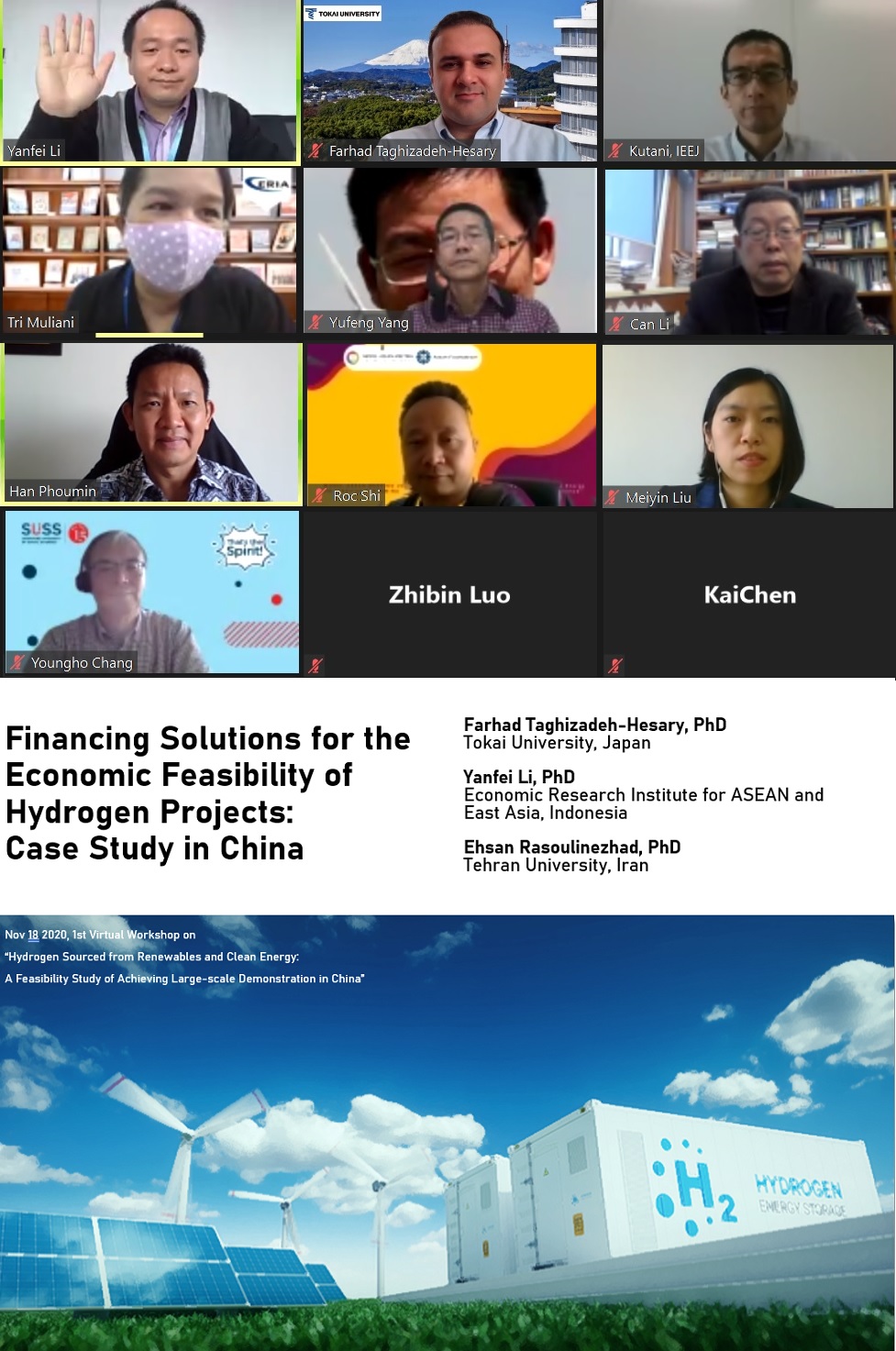 |
Dr. Farhad Taghizadeh-Hesary delivered a speech on the economic burden of neurological disorders in Japan at the Neuroscience-20 (N20) symposium of the G20 summit
Neurological disorders are increasingly recognized as major causes of death and disability worldwide. As populations are aging, and the prevalence of major disabling neurological disorders steeply increases with age, governments will face increasing demand for treatment, rehabilitation, and support services for neurological disorders. Just in the US, the combined annual costs of Alzheimer’s and other neurological disease totals nearly 800 billion dollars and is rapidly rising. Neuroscience 20 (N20), an initiative of the G20, organized by the Society for Brain Mapping and Therapeutics on Nov 21-22, 2020, by gathering world-leading neuroscientists, practitioners, economists, and policymakers to discuss the topic and to prepare policy recommendations and drafting a resolution for the G20 leaders.
In this event, Dr. Farhad Taghizadeh-Hesary presented his latest research on the economic burden of neurological disorders in Japan and also contributed to the resolution drafting from the economic perspectives.
Full agenda: G20-N20 Program Draft 20_11182020 (ymaws.com)
Reference of Dr. Farhad Taghizadeh-Hesary’s talks: Economic Burden of Neurological Disorders in an Aging Society (Japan): A Panel Data Analysis | Asian Development Bank (adb.org)
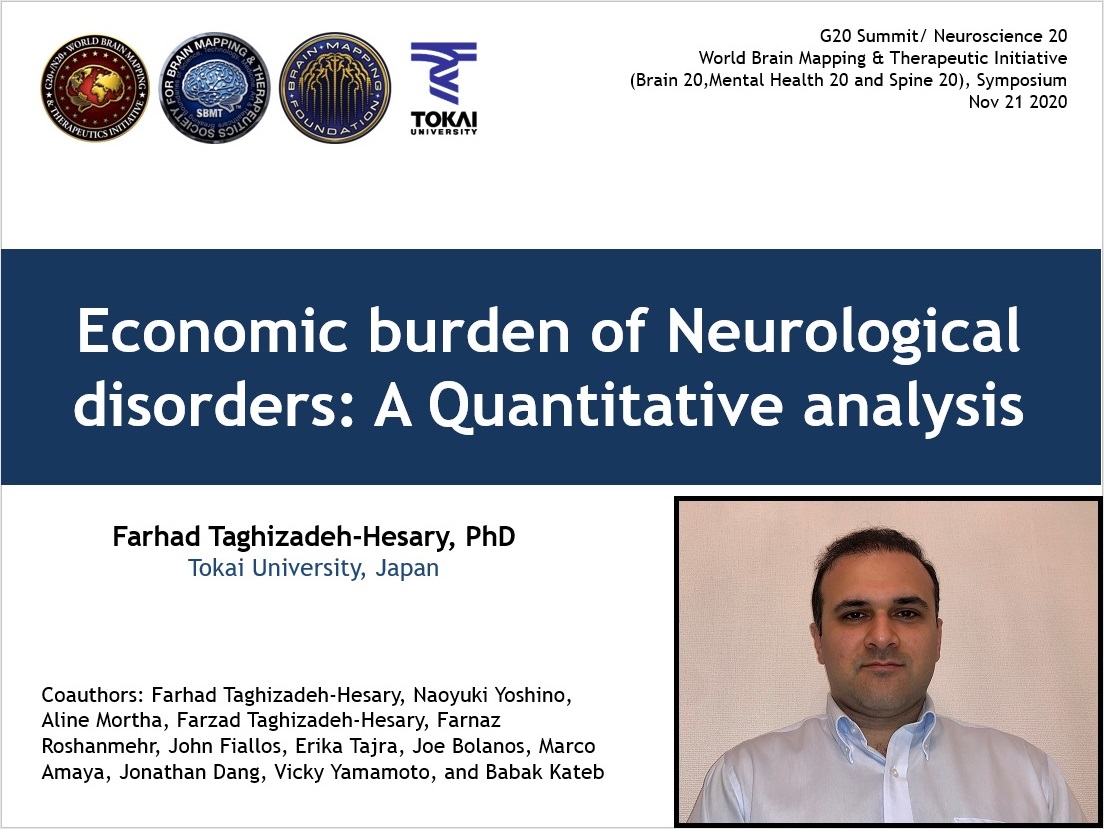 |
Dr. Farhad Taghizadeh-Hesary chaired the virtual workshop session on “Reforming Asian Utilities: Institutional Reforms for Boosting Private Investments.”
Asian utilities have been the subject of market-based economic reforms over the past few decades. However, the complexities of introducing market-based reforms in utility industries have been revealed by the reform experiences of many developing countries in the region. Today, Asia’s power sector faces challenges associated with de-carbonization, security of supply, energy access, energy market efficiency, and sourcing adequate financing to meet energy policy objectives. Difficulty in accessing finance is one of the critical factors constraining the involvement of the private sector in Asian utilities.
The Virtual Workshop on Reforming Asian Utilities: Institutional Reforms for Boosting Private Investments was organized by the Asian Development Bank Institute (ADBI), Economic Research Institute for ASEAN and East Asia (ERIA), and the Economic Analysis and Policy journal (Elsevier) on Nov 18-19, 2020. Dr. Farhad Taghizadeh-Hesary chaired the session on this first day on “Private investment in utilities and renewable energy projects.” This event featured new research on the development of Asian utilities, reforms for promoting sector-specific objectives, and ways of attracting private investment. Among the focuses were evaluating existing institutional frameworks, identifying areas in need of change, and addressing implementation challenges.
Papers presented during this virtual conference will be considered for inclusion in a special issue of the journal Economic Analysis and Policy (Scopus, Web of Science: SSCI, Impact factor: 1.973) with the co-editorship of Dr. Farhad Taghizadeh-Hesary.
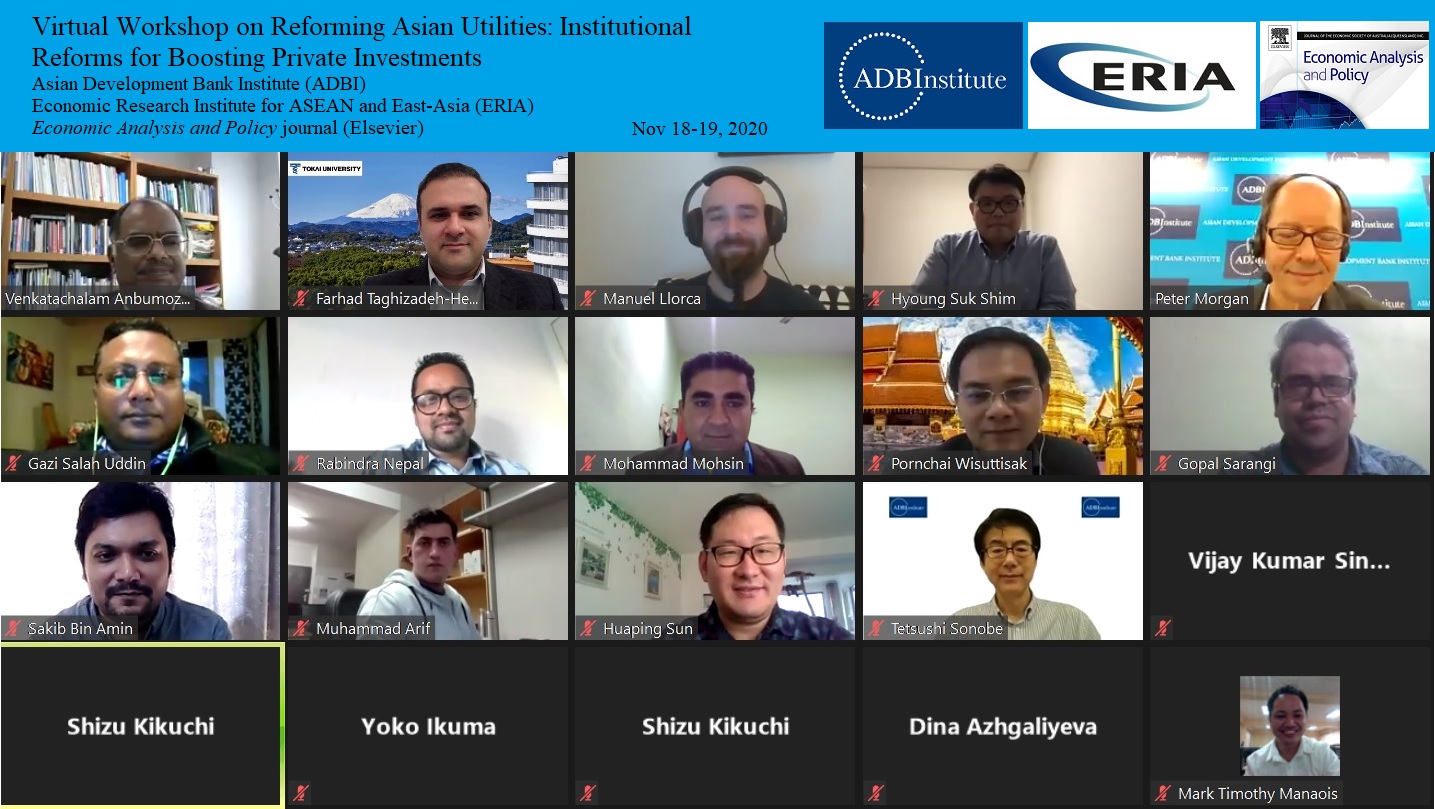 |
Dr. Farhad Taghizadeh-Hesary chaired the session at the virtual conference on “Electricity Markets in Transition” organized by the Asian Development Bank Institute, the University of Wollongong (Australia), and the Energy Economics (Journal).
The liberalization of the global electricity sector has subjected electricity markets to varying levels of competition and regulation. Growing demand for electricity and investment in the sector in Asia and the Pacific is prompting the region’s developing economies to strengthen their energy reform agendas while considering the need to raise the share of renewable energy in electricity generation.
The virtual conference on Electricity Markets in Transition: Privatization, Competition, and Regional Cooperation was organized by the Asian Development Bank Institute (ADBI), the University of Wollongong (Australia), and the Energy Economics journal of Elsevier on Nov 4-5, 2020.
Dr. Farhad Taghizadeh-Hesary chaired the session on “Electricity Market Regulation and Competition” on the second day of this prestigious event. This virtual conference featured new research on the liberalization of the global electricity sector. Among the focuses were effective policy development, raising renewable energy share in electricity generation, and prospects for greater regional cooperation within the sector.
The papers presented during this virtual conference will be considered for inclusion in a special issue of the journal Energy Economics (Scopus, Web of Science: SSCI, Impact factor: 5.203) with the editorship of Dr. Farhad Taghizadeh-Hesary.
 |
Dr. Farhad Taghizadeh-Hesary co-hosted a webinar on Fiscal and Environmental Sustainability in the Post-COVID-19.
The Covid-19 pandemic is putting governments globally in severe fiscal status. From one side, the government revenues reduced as the economic downturns are shrinking the tax revenues drastically. On the other side, government expenditures increased substantially, as governments need to spend more on healthcare, protection measures, and transfer payments. Hence, it is vital to look for sound fiscal policies that can secure the economic growth in the Post-COVID-19 and, at the same time, reduce the budget deficit and keep fiscal sustainability. While looking for optimal fiscal policy to achieve fiscal sustainability, it is also crucial to consider environmental sustainability simultaneously. Fiscal policy has an essential role in assuring the sustainable use of resources and keeping the environment. This applied to both sides of the government budget. On the revenue side, carbon taxation and green bonds are two essential tools for stimulating green growth. On the other hand, tax cuts and subsidies can incentivize investments in green projects for sustainable development on the expenditure side.
With this background, On Oct 29, 2020, the webinar titled “Fiscal and Environmental Sustainability in the Post-Covid 19” jointly organized by Tokai University (Japan); Yonsei University (Republic of Korea), and Climate Bond Initiative (UK). The webinar aimed to gather senior-level experts from academia, governments, and the financial sector to discuss how to achieve fiscal and environmental sustainability in the Post-COVID-19.
The webinar started with the welcoming remarks of Professor Prof. Naoto Yoshikawa, Vice-Chancellor, Tokai University, Japan, and Prof. Taejeong Lee, Dean, College of Government and Business, Yonsei University, Republic of Korea.
Then in the first session, two keynote speakers delivered their speeches. The first keynote speech was by Prof. Naoyuki Yoshino (Professor Emeritus, Keio University, Japan; Director, Financial Research Center, FSA Institute, Government of Japan; Lead Chair, T20/G20 Japan 2020; Visiting Professor, GRIPS). The title of his keynote speech was: “Optimal Fiscal Policy for Fiscal Sustainability in the Post-COVID-19”. The second keynote speaker was Dr. Kwang-yeol Yoo, Visiting Fellow, Asia Research Center, Yonsei University, Former First Senior Deputy Governor, Korea FSS, and his keynote speech title: Korea’s New Green Initiative to Sustain the Economy.
The next session had seven presentations by speakers from different countries:
Presentation 1: “Population aging and effectiveness of fiscal policy” by Prof. Hiroaki Miyamoto (Tokyo Metropolitan University, Japan)
Presentation 2: “Frequent issuers and asymmetric information in green bonds markets” by Dr. Suk Hyun (Yonsei University & Asia Research Center, Republic of Korea)
Presentation 3: “Green bond for infrastructure financing through the value capture model”byMr. Cedric Rimaud (Climate Bond Initiative, Singapore);
Presentation 4: “Empirical analysis of the characteristics of green bond markets in Asia, Europe, and America” by Dr. Farhad Taghizadeh-Hesary (Tokai University, Japan)
Presentation 5. “Fragility in modeling consumption tax revenue: implications for post-Covid-19” by Dr. Kazuki Hiraga (Faculty of Political Science and Economics, Tokai University, Japan)
Presentation 6: “Fiscal policy response during Covid-19 and beyond”by Dr. Gazi Salah Uddin (Linpoking University, Sweden)
Presentation 7: “How to advance the green bond markets by providing support for cross-border flows” by Mr. Jerome Pirouz (TCX Fund, The Netherlands) and Mr. Javier Oseguda (Astris Finance, Mexico)
The last section was the panel discussion on fiscal policy’s role in the three stages of Covid-19, which are: Emergency stage, exit stage, and the new normal file.
This session had two panelists:
Prof. Naoyuki Yoshino (Professor Emeritus, Keio University, Japan; Director, Financial Research Center, FSA Institute, Government of Japan; Lead Chair, T20/G20 Japan 2020; Visiting Professor, GRIPS)
Mr. Kwangchul Ji, (Director, International Organization Division, Ministry of Economy and Finance, Republic of Korea)
The event was initiated, co-hosted, and moderated by Dr. Farhad Taghizadeh-Hesary.
The video of the whole webinar is available below link:
https://www.youtube.com/watch?v=ZP0BKIKQZRI&t=42s&app=desktop
 |
Dr. Farhad Taghizadeh-Hesary delivered a keynote speech at the workshop on Finance for Sustainability, Climate Change, and Circular Economy.
On Oct 15, 2020, the virtual workshop on “Finance for Sustainability, Climate Change and Circular Economy” was organized by Peking University HSBC Business School (PHBS) Oxford Campus and the Chinese Economic Association (CEA) The United Kingdom. Dr. Farhad Taghizadeh-Hesary, the keynote speech of this event. His presentation was on “optimal portfolio selection for investment in Sustainable Development Goals – SDGs.” The reference of his talks was based on his recent journal publication, which is available through this link: https://doi.org/10.1016/j.frl.2020.101695
 |
Dr. Farhad Taghizadeh-Hesary was invited to speak for the new recipients of the MEXT scholarship.
On Oct 13, 2020, Dr. Farhad Taghizadeh-Hesary spoke as a special guest for the student who newly received the Japanese government scholarship (MEXT).
In this meeting, Dr. Taghizadeh-Hesary, a MEXT alumnus who got this scholarship in 2011, spoke about study in Japan and the essential points that the students need to consider during their study period in Japan.
He explained his own experiences, formerly as a Ph.D. student, and since 2015 as a university lecturer. Then he answered the students’ questions regarding study and life in Japan.
This year, 14 Iranian students got MEXT scholarship and soon will start their studies at different Japanese universities
 |
Dr Farhad Taghizadeh-Hesary’s newly edited book titled: "Energy Insecurity in Asia: Challenges, Solutions, and Renewable Energy" published by the Asian Development Bank Institute.
Unlike energy security, energy insecurity has not been extensively studied. While energy security is broadly understood to represent energy resources' securing, mere physical availability does not necessarily mean that the resources can reach end-users.
Energy insecurity is not merely a mirror image of energy security, given the diverse consequences and impacts of the unavailability of energy for households.
Energy Insecurity in Asia will identify the challenges and explore potential solutions in the context of energy insecurity in Asia.
The book, in 367 pages, consists of two parts. Part I provides thematic and regional studies and solutions for dealing with energy insecurity in different Asian subregions. Part II discusses the importance of renewable energy in addressing energy insecurity and presents several country case studies. There are many factors that countries investing in renewables must consider, such as energy security, climate change mitigation, and reducing air pollution. This book is a timely and valuable resource for researchers and policymakers. It provides insightful case studies and offers practical policy recommendations for solving energy insecurity in Asia and other regions.
*The Asian Development Bank Institute is affiliated with the Asian Development Bank (ADB). An Asian think tank based in Tokyo, Japan, focused on identifying effective development strategies for Asia and the Pacific and supporting ADB member countries in managing development challenges. ADBI is the world's top-ranked government-affiliated think tank, according to the latest Global Go To Think Tank Index Report by the University of Pennsylvania Think Tanks and Civil Societies Program.
Link to the book (free download):
https://www.adb.org/publications/energy-insecurity-asia
 |
Dr. Farhad Taghizadeh-Hesary delivered a keynote speech at the International Conference on Business and Finance 2020 (ICBF 2020)
ICBF 2020 is organized and hosted by the University of Economics Ho Chi Minh City, Vietnam, and co-organized by the University of Leicester, United Kingdom. The University of Lincoln, United Kingdom also participated in this event. Due to COVID-19 and restrictions for the travel of international speakers, the conference was onsite and online. The venue of the conference was the University of Economics Ho Chi Minh City, Vietnam. More than a hundred scholars, researchers, and graduate students from Vietnam and various countries participated in this event. The keynote speech title of Dr. Farhad Taghizadeh-Hesary was the “Importance of Green Finance for a Greener World in the Post-COVID-19”. In his keynote speech he talked about COVID-19 and the oil price collapse, the importance of green finance in the post- COVID-19, and the development of the green credit guarantee scheme as a solution for boosting the private investments in green projects.
 Picture_ UEH Farhad Taghizadeh-Hesary, Aug 28 2020
Picture_ UEH Farhad Taghizadeh-Hesary, Aug 28 2020 |
Dr. Farhad Taghizadeh-Hesary chaired the virtual conference on “Low-Carbon Finance and the Sustainable Development Goals” organized by the Asian Development Bank Institute.
Low-carbon finance and investment are essential to the growth of green energy projects that reduce carbon emissions and their negative health impacts, build climate-resilient infrastructure, and promote environmental sustainability, in accordance with the 2030 Sustainable Development Goals (SDGs). Yet, global investment in renewable energy and energy efficiency has declined in the last few years and could slow further while investment in fossil fuels remains dominant.
The virtual conference on Low-Carbon Finance and the Sustainable Development Goals was organized by the Asian Development Bank Institute (ADBI) on Aug 12-14, 2020. Dr. Farhad Taghizadeh-Hesary chaired the second day of this prestigious event. This ADBI virtual conference featured research that examined impediments to low-carbon finance such as the lack of unified criteria for investment that advances climate-related SDGs and limited understanding of the fundamentals of low-carbon finance. It also addressed common questions about low-carbon finance, including the difference between green and traditional bonds, the extent to which green bond issuance reduces emissions, and policies needed to encourage investment that promotes climate-related SDGs.
Papers presented during this virtual conference will be considered for inclusion in a special issue of the journal Finance Research Letters (Scopus, Web of Science: SSCI, Impact factor: 3.527) with the editorship of Dr. Farhad Taghizadeh-Hesary.
 |
Dr Farhad Taghizadeh-Hesary edited the book titled: Energy Sustainability and Development in ASEAN and East Asia
Jointly with Dr. Phoumin Han, Senior Energy Economist, Economic Research Institute for ASEAN and East Asia (ERIA) & Professor Fukunari Kimura, Professor of Economics, Keio University, Japan and Chief Economist, ERIA
The book just published by Routledge in London.
This book provides several multi-dimensional quantitative analysis of the relationship between energy and other subjects including but not limited to income and economic growth, environment and health, food and agricultural production.
The book also provides the most constructive policy recommendations concerning the relationship between energy, economic development, social development, and environmental development.
DOI: https://doi.org/10.4324/9781003026075
 |
Yonsei University - Tokai University joint webinar
This event will be organized jointly by Tokai University (Japan) and Yonsei University (Republic of Korea). In this event, distinguished speakers from universities, financial sector and multilateral development bank will present their latest research findings on the topic. The objective is to provide policy recommendations for governments and financial institutions in financing the Covid-19 recovery plans using capital market especially through the issuance of green bonds and impacts bonds.
Date and Time: July 30, 2020 (9:00-12:30 Japan and Korea standard time)
Registration:https://docs.google.com/forms/d/1vezhiP9ft4SLdmsrguQM74gTuUtT40el55-J0mjceHc/viewform?edit_requested=true
Note: You will receive the login information of the webinar by email after your registration approved by the secretariat.
 |
 |
Dr. Farhad Taghizadeh-Hesary chaired the special session of the Asian Economic Development conference (AED2020)
Poverty reduction in all its forms remains one of the greatest challenges facing humanity. In developing Asia, rapid growth in countries and sub-regions such as China, India and South-East Asia lifted millions out of poverty, but progress has been uneven. On the other hand, the current covid19 pandemic and the global economic recession that it caused is pushing millions of people back to poverty.
On July 20, 2020 the special session of the Asian Economic Development (AED2020) on poverty eradication and inclusive sustainable growth, organized by Chiang Mai University, Thailand (Webinar). The objective was to present several empirical studies on the roles of small and medium-sized enterprises, local businesses and trusts, international remittances and microfinance, energy security and energy efficiency in poverty reduction and inclusive growth.
It was a pleasure for me to chair this session.
 |
Dr. Taghizadeh held a seminar at Iran-Tehran University.
On Sunday Feb 16th, I had my seminar titled: Green Finance: Energy Security and Sustainable Development At the faculty of economics, Tehran University in Tehran. Almost 70 professors and graduate students participated in this seminar. I talked about different instruments for filling the green financing gap, role of renewable energy in improving the energy security and the optimal portfolio selection for investment in sustainable development goals, all came from my published papers and books.
The presentation was very interesting for the participants and many participants asked questions and I answered. At the end of the seminar I presented two of my recent published books to the deputy dean of the faculty for keeping at the library of Tehran university so that students and professors can use it.
After the seminar, I had discussion with the faculty for research and academic collaborations and we are planning for co-supervision of PhD students of Tehran university, faculty of economics.
 |
Seminar on "Japan-ASEAN: Economic and Energy Outlook" hosted by Dr. Taghizadeh was held.
The seminar on "Japan-ASEAN: Economic and Energy Perspectives" organized by the IIST at the Faculty of Political Science and Economics, Tokai University on January 28, 2020. The seminar started by the welcoming remarks of Prof. TSUJINAKA, Vice-Chancellor of Tokai University and Prof. Takeuchi, head of Economics dept. of the Faculty of Political Science and Economics, Tokai University. The opening remarks was by Dr. Farhad Taghizadeh-Hesary, Jr. Associate Professor of IIST who was the organizer of this event. Dr. Taghizadeh-Hesary in his opening remarks highlighted the importance of the cooperation between Japan and ASEAN. He stated that this cooperation contributed to the economic prosperity of the Southeast Asian economies for the last decades. At the same time, Japan has also used ASEAN economies as destination of her industrial relocations. This is to target a cost minimization of its production, especially, labor and land cost of ASEAN countries. In addition, ASEAN economies with young population and increasing middle-income class are suitable markets for Japanese products export. He added that, the seminar aims to focus on the recent progress of Japan-ASEAN economic relationship and the perspective of it in the China’s Belt and Road era in two aspects of Political-Economic and Energy with the focus on new and environmental friendly energies and specially hydrogen.
The first presenter was Dr. Nisit Panthamit who is Associate Professor of Economics at the Faculty of Economics, Chiang Mai University in Thailand and the Director of Center for ASEAN studies. He got PhD in economics from Wisconsin Milwaukee University in the US. He has extensive publications in international economics, trade and investment, and economic integration in prestigious journals and books. Dr. Nisit Panthamit talked on Japan-ASEAN cooperation in the era of Chinese Belt and Road. He mentioned that among ASEAN member countries, Japanese brands have popularity but gradually the competitiveness of Japanese products are reducing in the region comparing to Chinese products. He mentioned some policy recommendations for Japan in order to keep their cooperation size with ASEAN, including using potential of Japanese small and medium-sized enterprises (SMEs). Many Japanese SMEs are producing high quality products; ASEAN market will provide good opportunity for them to expand their businesses out of Japan. In addition, this cooperation will provide other opportunities such as establishing joint venture companies with ASEAN SMEs. SMEs are a sector that Chinese Belt and Road Initiative (BRI) is not targeting as BRI is more focusing on large scale projects. Furthermore, he highlighted role of academic diplomacy that will help Japanese students to know ASEAN culture and market better and will increase the mutual understanding.
The second presentation was by Dr. Yanfei Li who is Associate Professor of Economics, Faculty of Economics, Hunan University of Technology and Business of China and Research Fellow of the Economic Research Institute for ASEAN and East Asia (ERIA) in Indonesia. Dr. Li got his PhD degree in economics from Nanyang Technological University in Singapore, He has extensive publications in energy economics, energy policy areas in prestigious journals and books. His presentation was on economics and environmental implications of renewable energy with the focus on hydrogen energy in Japan and ASEAN. He presented results of his joint study with Dr. Farhad Taghizadeh-Hesary on feasibility of Hydrogen and applicability of it as a fuel source. According to the study, presently hydrogen with the price of 7-8$/Kg is not feasible but the study shows that if considering the current trend of cost reduction, within 2030 we should expect to have hydrogen as a feasible source of energy in the transportation sector. He mentioned that policies such as carbon pricing/carbon taxation can shorten this period. He proposed that establishment of Japan-China-ASEAN green and intelligent energy scheme would provide peace and promote connectivity in the region. Japan had high level of hydrogen technology, Chinese companies have high interest to invest into hydrogen projects and ASEAN will provide the market for establishment of the ASEAN-China-Japan hydrogen pathway.
Then after a coffee break, Question and Answer session organized that most participants asked their question and presenters answered. Dr. Farhad Taghizadeh-Hesary concluded the seminar by highlighting the key points of the two presentations.
 |
||
 |
 |
|
 |
||
 |
 |
|
The 9th Tokai University Tenure Track System Symposium
"Artwork and Science"
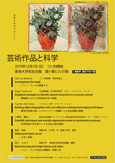 Ms. Kaori Taguchi, Institute of Innovative Science and Technology (IIST), has been conducting optical research on contemporary art stored in Japan, in cooperation with art history research and historical research to reconstruct the composition of the work, the history of production, and research on the history.
Ms. Kaori Taguchi, Institute of Innovative Science and Technology (IIST), has been conducting optical research on contemporary art stored in Japan, in cooperation with art history research and historical research to reconstruct the composition of the work, the history of production, and research on the history.
Her findings were shared at symposiums held at Tokai University in 2017 and 2018.
This year, a symposium entitled “Art and Science” will be held on December 1st at Kasumigaseki. This symposium will be focused on more active and broad academic exchange with researchers in various adjacent fields in every institution.
The symposium brings together experts who are trying to open up new research perspective by “cutting science and art together” in various countries, and share their achievements and view point.
December 1st , 2019 13:00
The Tokai University Club, Kasumigaseki Building 35F
【Speaker】
| Oda van Maanen | : | Van Gogh Museum |
| Diego Tamburini | : | The British Museum, Department of Scientific Research |
| Tay Ann Ann Diana | University of Melbourne | |
| Onoda Mayu | HORIBA TECHNO SERVICE Co., Ltd. Analytical Technology Center | |
| Murotani Hiroshi | Tokai University, School of Engineering | |
| Taguchi Kaori | Tokai University, Institute of Innovative Science and Technology |
International Symposium SMELL in Contemporary Art
|
|
The 7th Symposium for Tenure Track Program
|
|
International Symposium The Ganges River Dolphin
Visit here for more information. |
|
The 6th Symposium for Tenure Track Program
|
|
International Symposium
Baleen Whale Behavior
Visit here for more information. |
|
Tokai University Micro/ Nano Enlightenment 【Tμne】
Visit here for more information. |
|
Tokai University Micro/ Nano Enlightenment 【Tμne】
| Date | : | Thursday, July 24, 2014 |
| Time | : | 10:00 〜 17:30 |
| Venue | : | Tokai University Shonan Campus |
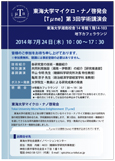 |
[Click to download flyer] (635KB PDF) |
|
FY2014 Tenure Track Researcher Arrival Seminar
| Date | : | Friday, June 27, 2014 |
| Time | : | 16:30~17:30 |
| Venue | : | Tokai University Shonan Campus |
Tokai University Micro/ Nano Enlightenment 【Tμne】
| Date | : | Tuesday, February 25, 2014 |
| Time | : | 10:00 〜 19:00 |
| Venue | : | Tokai University Shonan Campus |
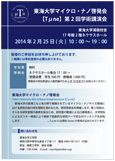 |
[Click to download flyer] (693KB PDF) |
|
FY2013_3 Tenure Track Researcher Arrival Seminar
| Date | : | Tuesday, February 18, 2014 |
| Time | : | 17:00~18:00 |
| Venue | : | Tokai University Isehara Campus |
International Symposium
DOLPHIN ACOUSTICS, BEHAVIOR AND COGNITION
| Date | : | Sunday, February 2, 2014 |
| Time | : | 10:00~17:30 |
| Venue | : | Shizuoka Convention & Arts Center “GRANSHIP” Room #901 |
The 4th Symposium for Tenure Track Program
| Date | : | Saturday, December 14, 2013 |
| Time | : | 13:00 ~ 18:00 pm |
| Venue | : | Tokai University Isehara Campus (143, Shimokasuya, Isehara-shi,Kangawa) |
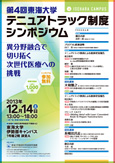 |
[Click to download flyer] (1.9MB PDF/ Japanese-only) | |
FY2013_2 Tenure Track Researcher Arrival Seminar
| Date | : | Monday, November 25, 2013 |
| Time | : | 17:30~18:30 |
| Venue | : | Tokai University Shimizu Campus Broadcasted on TV: Shonan Campus |
FY2013 Tenure Track Researcher Arrival Seminar
| Date | : | Friday, June 7, 2013 |
| Time | : | 17:00~18:00 |
| Venue | : | Tokai University Shonan Campus |
The 3rd Symposium for Tenure Track Program
| Date | : | Friday, December 14, 2012 |
| Time | : | 13:00~18:00 |
| Venue | : | Tokai University Takanawa Campus (2-3-23, Takanawa, Minato-ku, Tokyo) |
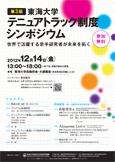 |
[Click to download flyer] (1.0MB PDF/ Japanese-only) | |
FY2012 Tenure Track Researcher Arrival Seminar
| Date | : | Tuesday, May 22, 2012 |
| Time | : | 17:00~18:00 |
| Venue | : | Tokai University Shonan Campus |
FY2011-2 Tenure Track Researcher Arrival Seminar
| Date | : | Friday, February 17, 2012 |
| Time | : | 17:00~18:00 |
| Venue | : | Tokai University Isehara Campus |
The 2nd Symposium for Tenure Track Program
| Date | : | Monday, December 19, 2011 |
| Time | : | 14:00~18:00 |
| Venue | : | The Tokai University Club (Kasumigaseki, Chiyoda-ku, Tokyo) |
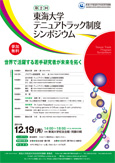 |
[Click to download flyer] (1.7MB PDF/ Japanese-only) | |
FY2011 Tenure Track Researchers Arrival Seminar
| Date | : | Thursday, May 12, 2011 |
| Time | : | 17:00~18:00 |
| Venue | : | Tokai University Isehara Campus |




